Why African nations are walking a fine line on Russia’s invasion of Ukraine
Many African governments have avoided condemning Moscow due to factors including political reliance on Vladimir Putin, imports from weapons to wheat, and a history of non-alignment, writes Portia Crowe

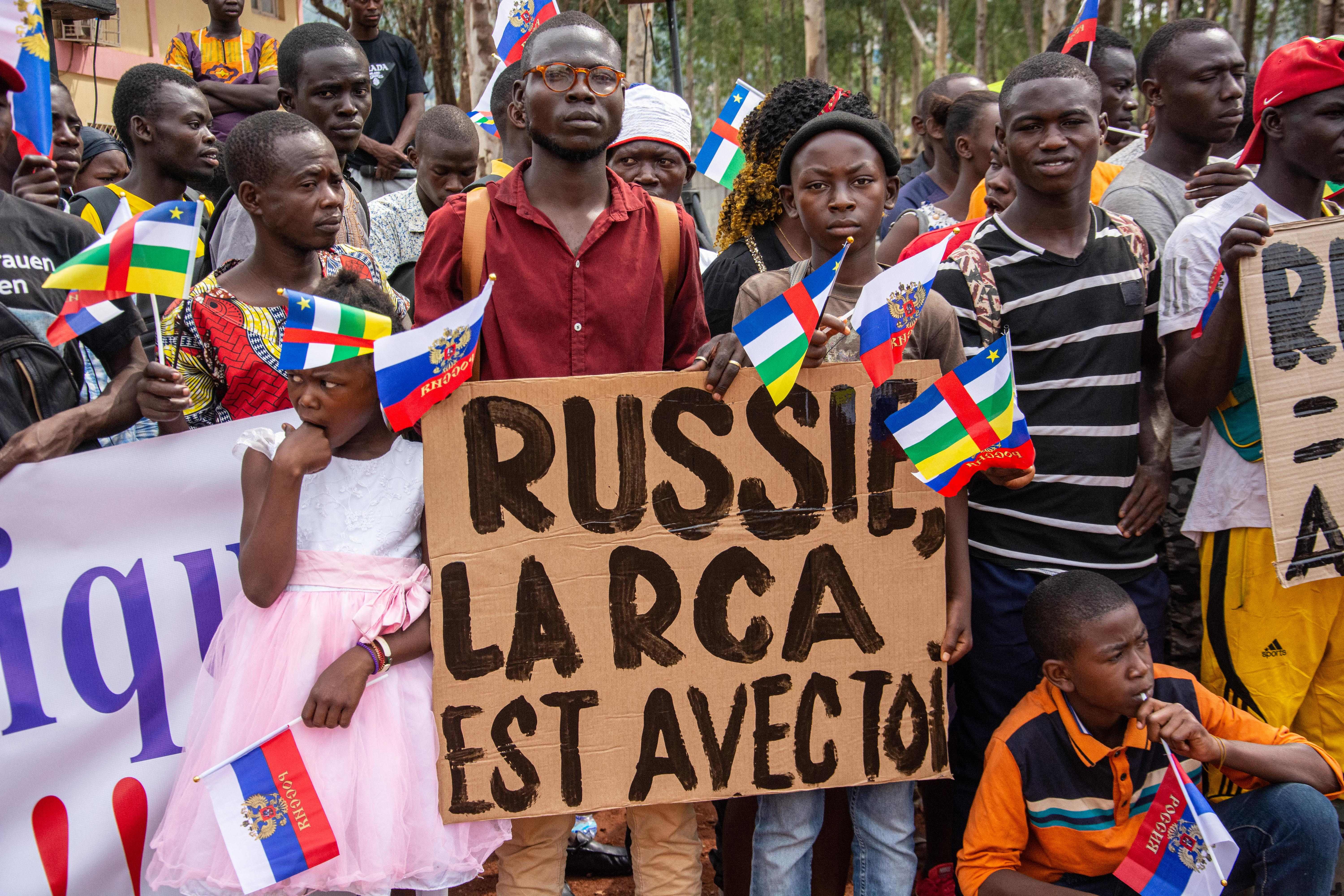
To understand the diplomatic quandary facing African nations when it comes to Russia’s war with Ukraine, one has to look no further than South Africa.
On the first day of the invasion, South Africa’s Ministry of International Relations issued a statement urging Moscow to immediately withdraw its forces.
The next day, however, president Cyril Ramaphosa took a different tone, calling instead for mediation and implying that US president Joe Biden was partly to blame for the conflict.
Last week, Ramaphosa spoke with his Russian counterpart, tweeting shortly after to thank Vladimir Putin for the call and saying: “President Putin appreciated our balanced approach.”
The flip-flop indicates just how sticky a foreign policy issue the Russian invasion has been for non-western nations, especially in Africa. Leaders must account for the geopolitical, strategic and economic interests of their countries, and the stakes vary for each of the continent’s 54 states.
While in free-market, western-friendly Kenya, the country’s representative to the United Nations made an impassioned speech condemning Russia’s attack, the majority of African governments have kept quiet or issued sterile statements about the need for compromise.
Still others have openly demonstrated their support for Mr Putin, with representatives from Sudan and Mali flying to Moscow for meetings over the past two weeks – seemingly undeterred by the unfolding conflict across the border.
Of the 52 UN member states that did not vote in favour of a resolution to condemn Russia’s actions in this month’s emergency General Assembly, 25 were African. Some, ranging from Senegal to Sudan to South Africa, abstained, while others did not vote. Eritrea joined North Korea, Syria, Belarus and Russia itself in voting against the resolution.
“African countries don’t vote as a bloc – there are so many factors that motivate the individual responses,” said Leonard Mbulle-Nziege, a research analyst at Africa Risk Consulting, noting that African states “increasingly have more agency” when it comes to foreign policy.
“Leaders understand they don’t have to take a single path because relationships have broadened significantly over the last 20 to 25 years,” he told The Independent.
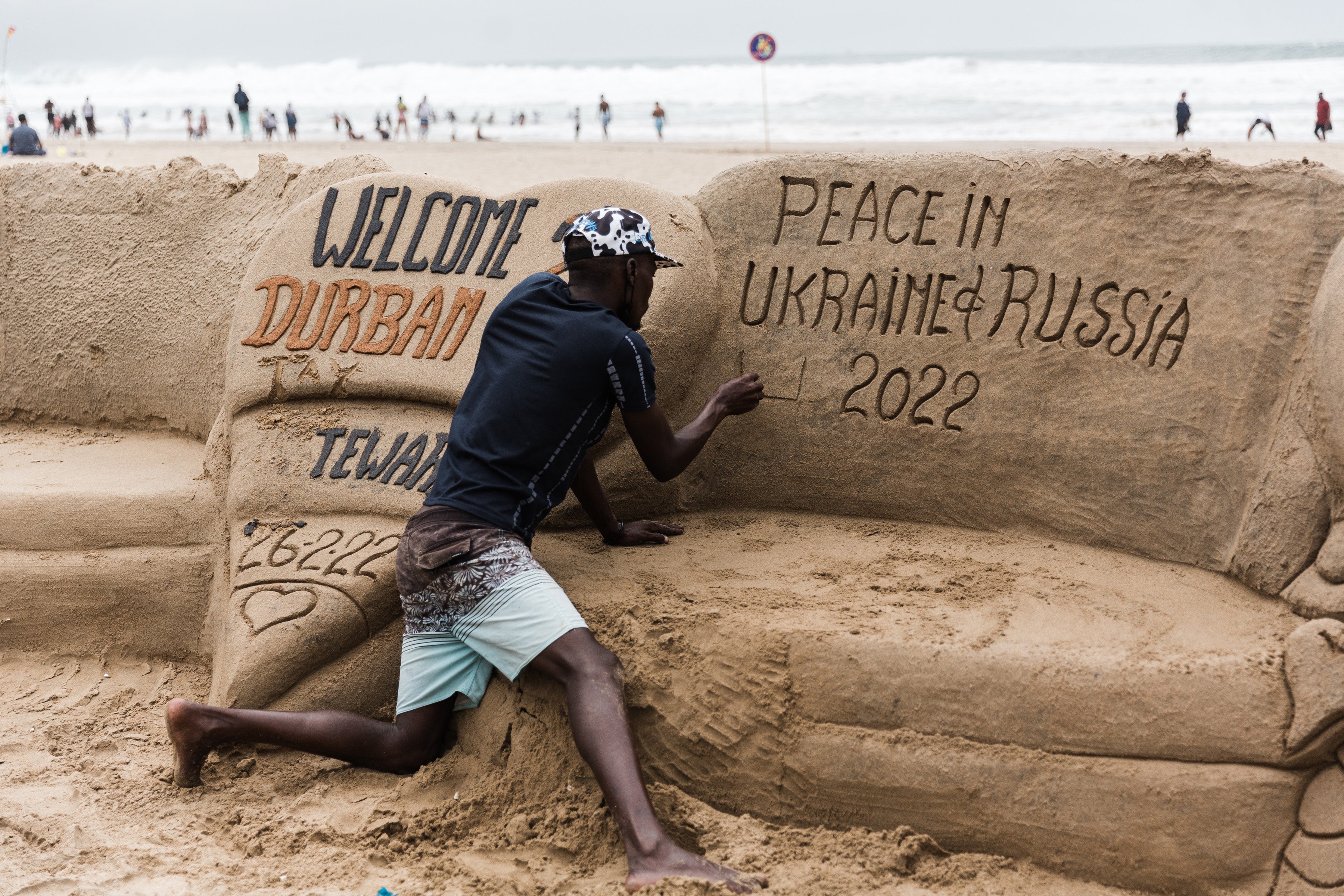
Less than 1 per cent of Africa’s foreign direct investment is estimated to come from Russia, but trade ties are increasing – and key among Africa’s imports are arms. Between 2012 and 2016, Russia was the largest supplier of weapons to Africa, supplying 35 per cent of total exports, according to the Stockholm International Peace Research Institute.
“Russia’s influence has been through these irregular means,” said Joseph Siegle, director of research at the Africa Centre for Strategic Studies. “[Moscow is] focused on co-opting individual leaders who are vulnerable, using disinformation, bringing in mercenaries, and providing arms-for-resources deals.”
Geopolitics watchers have compared a map showing the states that remained neutral at the UN General Assembly to maps depicting Russian military activity on the continent. There is notable overlap, such as in Mali and the Central African Republic, both countries where Russian mercenaries are currently operating. Cameroon, which did not vote, has received weapons from both Ukraine and Russia, according to Mr Mbulle-Nziege.
States are looking at their overall geostrategic interests above idealism
But military deals do not cover the whole picture. Many countries that voted to condemn Russia’s invasion of Ukraine at the UN also have cooperation agreements with the country, including Nigeria, Zambia and Egypt – all of which also import weapons from Moscow.
Even within administrations, there are deep divides over the conflict, as South Africa’s varied responses have indicated. Those divisions also extend to the rest of South Africa’s political class. While former president Jacob Zuma has brazenly stated his support for Mr Putin, the main opposition party lit up Cape Town’s city hall in the colours of the Ukrainian flag earlier this month.
“Some say we have a moral duty to stand with Ukraine,” said Mr Mbulle-Nziege, adding that there were others who had argued, “we support Putin because the west has been trying to encroach, and if it was the other way around they would do the same thing.”
Given its history of apartheid, South Africa usually takes a human-rights-based approach on foreign policy issues. But Moscow has a long history with the country and others in southern Africa, dating back to their liberation struggles against white minority rule. The Soviet Union was an ally to liberation movements including South Africa’s African National Congress (ANC).
Four days after the invasion of Ukraine, Russia’s foreign ministry took to Twitter to mark the 30th anniversary of its diplomatic relations with South Africa.
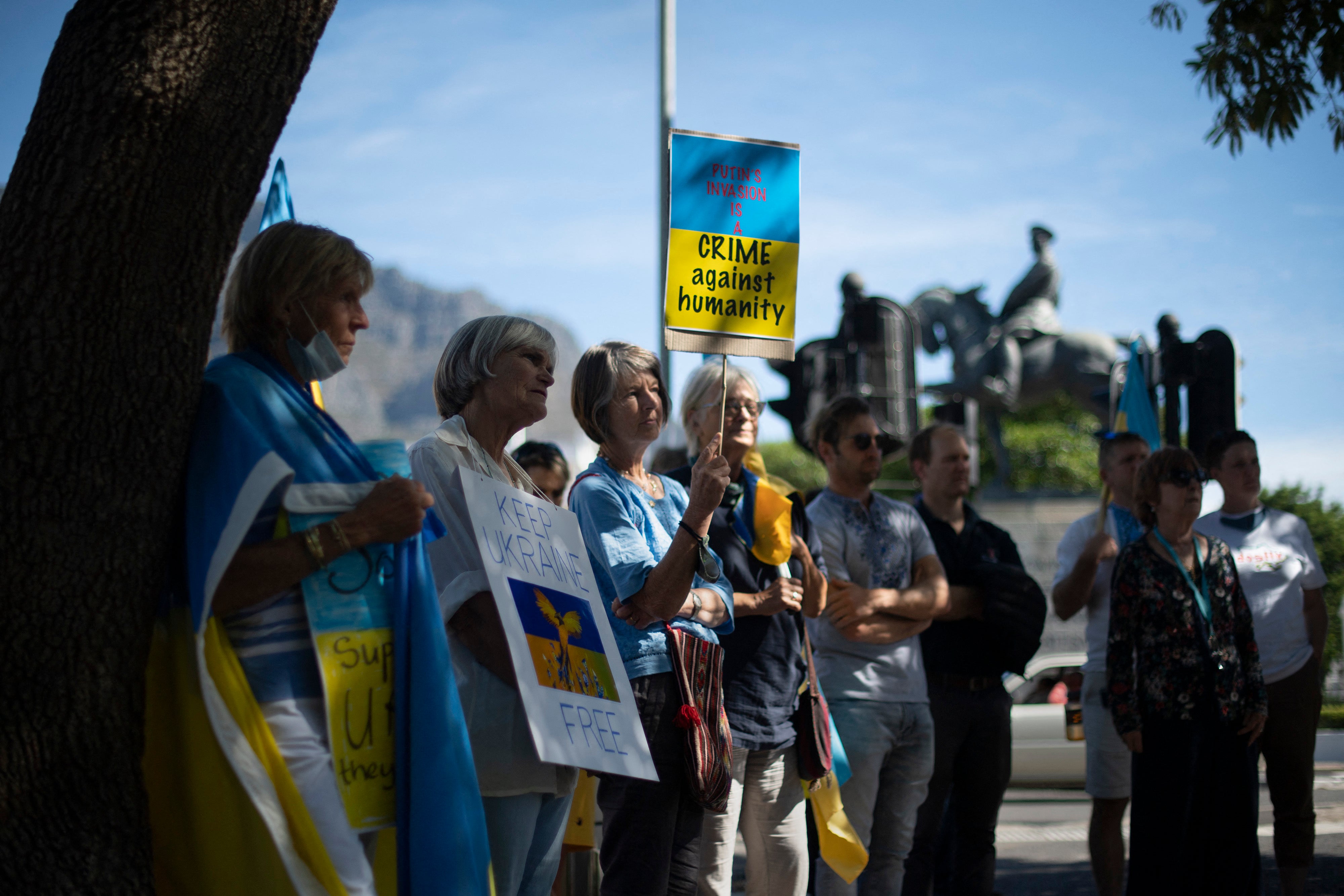
In addition to South Africa, Angola, Namibia, Zimbabwe, and Mozambique all abstained from last week’s vote.
Then there is more recent history. In 2011, South Africa voted at the UN Security Council in favour of a no-fly zone in Libya. It was a marked departure from the African Union’s stance on non-intervention, and as the situation in Libya deteriorated, it faced significant backlash.
Faith Mabera, a senior researcher at the Institute for Global Dialogue, said that might have been a “lesson learned by South Africa – that ‘perhaps on this issue, let’s err on the side of caution’”.
Analysts say African countries’ responses are not just a matter of picking sides between eastern and western powers.
“States are looking at their overall geostrategic interests above idealism,” said Mr Mbulle-Nziege.
Russia needs African countries just as much as - or maybe even more than - African countries need it currently
Many African nations have a history of neutrality dating back to the Cold War, when 25 countries – including ten in Africa – formed the Non-Aligned Movement, a political bloc that now has 120 member states around the world. Uganda, which will take over the bloc’s chairmanship next year, was among the countries that abstained from this month’s UN vote.
Given many countries’ histories of non-alignment, Ms Mabera warned against conflating neutrality with being pro-Russian. She said those that abstained “should be given the benefit of the doubt, instead of looking at everything through a geopolitical prism”.
One country that surprised some analysts by taking a neutral stance was Senegal, a nominally pro-west country whose president, Macky Sall, has a close relationship with France. Mr Sall is also the current chair of the African Union.
Mr Mbulle-Nziege noted that Senegal has one of the broadest diplomacy policies on the continent, with strong ties to the US as well as relations with China, Israel, Iran, Saudi Arabia, and both Russia and Ukraine. He said Senegal’s decision was most likely “about not trying to anger one side or the other”.
Senegal’s president spoke with Mr Putin on Wednesday. Mr Sall said in a tweet that he had called for a lasting ceasefire in Ukraine and urged continued dialogue and negotiation. The Kremlin, meanwhile, said in a statement that Mr Putin had stressed that Russia was working to safely evacuate foreign citizens from the eastern Donbas region.
Mr Siegle cautioned against lumping together all the countries that abstained or did not participate in this month’s UN vote. Rather, they can be categorised into several groups.
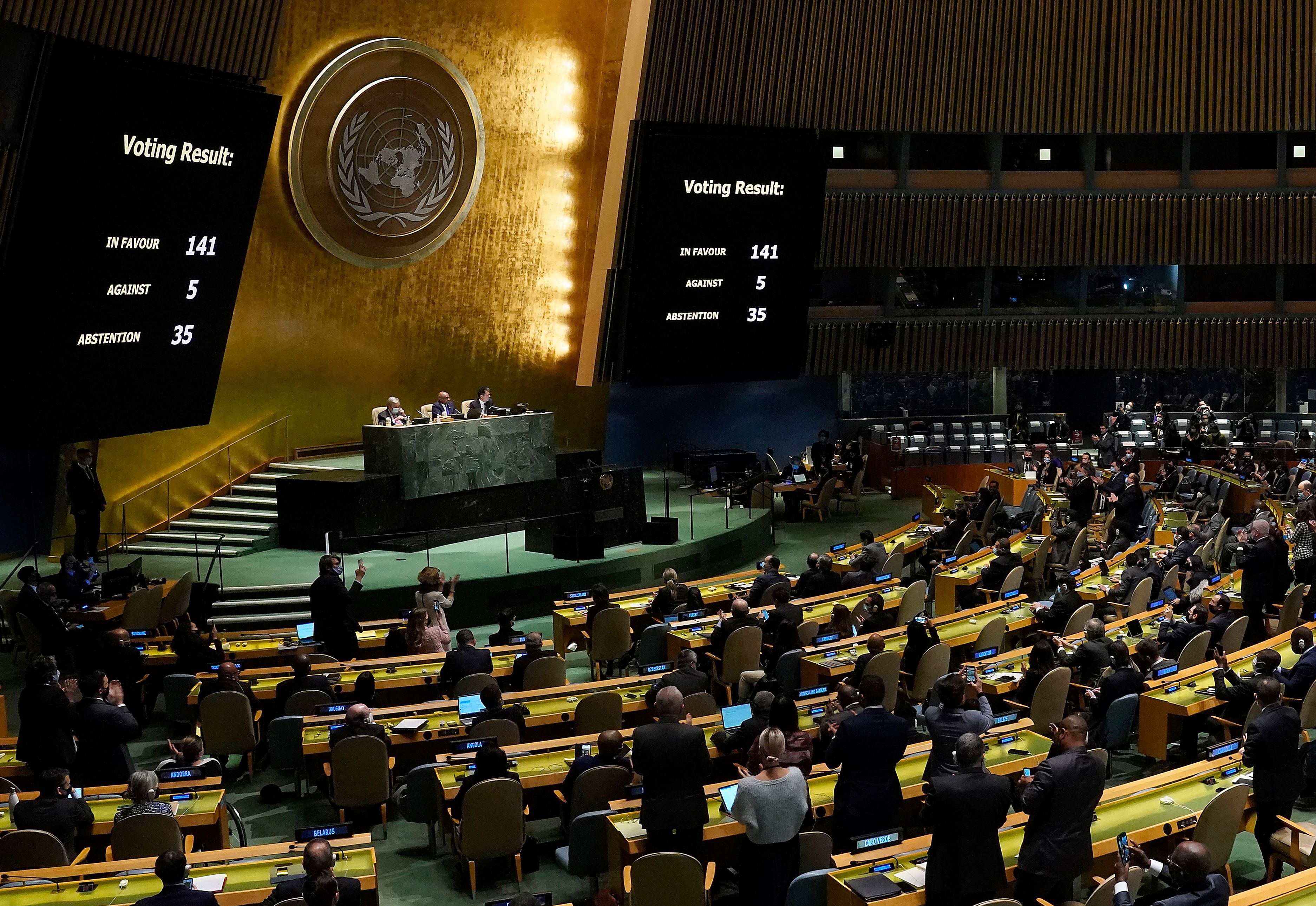
“The most obvious are the handful of countries that have leaders who are coopted,” he said, pointing to the Central African Republic’s Faustin-Archange Touadera, Mali’s Assimi Goita, and Sudan’s Abdel Fattah al-Burhan.
“These are folks who are very isolated, politically and economically, and they are heavily reliant on Russian political support and in some cases mercenary support,” he said. “They all benefit from Russian disinformation, so they’re very much in the pocket of Putin.”
Another category includes nations such as Angola, South Sudan, and Zimbabwe, whose leaders may be less compromised, but nonetheless benefit from patronage with Russia.
“They have a degree of independence, but they have no desire to move towards democracy or better governance or more transparency,” Mr Siegle said.
Then there are the countries, such as Senegal, Namibia and Morocco, that Mr Siegle believes abstained due to their histories of non-alignment.
“They are wanting to maintain neutrality, but these are countries that are actually better governed and operating under more transparency,” he added.
African leaders have had to weigh up other concerns, too, including food security and the safety of their expats in Ukraine.
Leaders “need to get safe passage for our people, for our students, in Ukraine,” said Idayat Hassan, director of the Centre for Democracy and Development in Nigeria. The analyst said that is why some governments may not have condemned Russia outright.
The poor treatment of many Africans within Ukraine, and racist incidents that have been reported over the past two weeks, may have affected the calculation for leaders in another way.
“They definitely took that into consideration, saying ‘you want us to support you, [but] you’re not even treating our nationals properly – we’re going to sit this one out,’” Mr Mbulle-Nziege said.
He also pointed to the fact that Russia and Ukraine are major wheat exporters to Africa, and suggested leaders may have hesitated to take a side on the conflict in case it hurts their food supplies in the near or long term. However, other analysts disagreed that this would be a factor.
As regards the UN General Assembly, it holds no power to enforce resolutions, and Ms Hassan said that governments such as Nigeria’s, which voted to reprimand Russia, are unlikely to take any further action.
“There is a difference between a vote and action,” she said. “Are they going to block trade relationships? Are they going to impose sanctions like the United States are doing? I think that would be a no, no, no.”
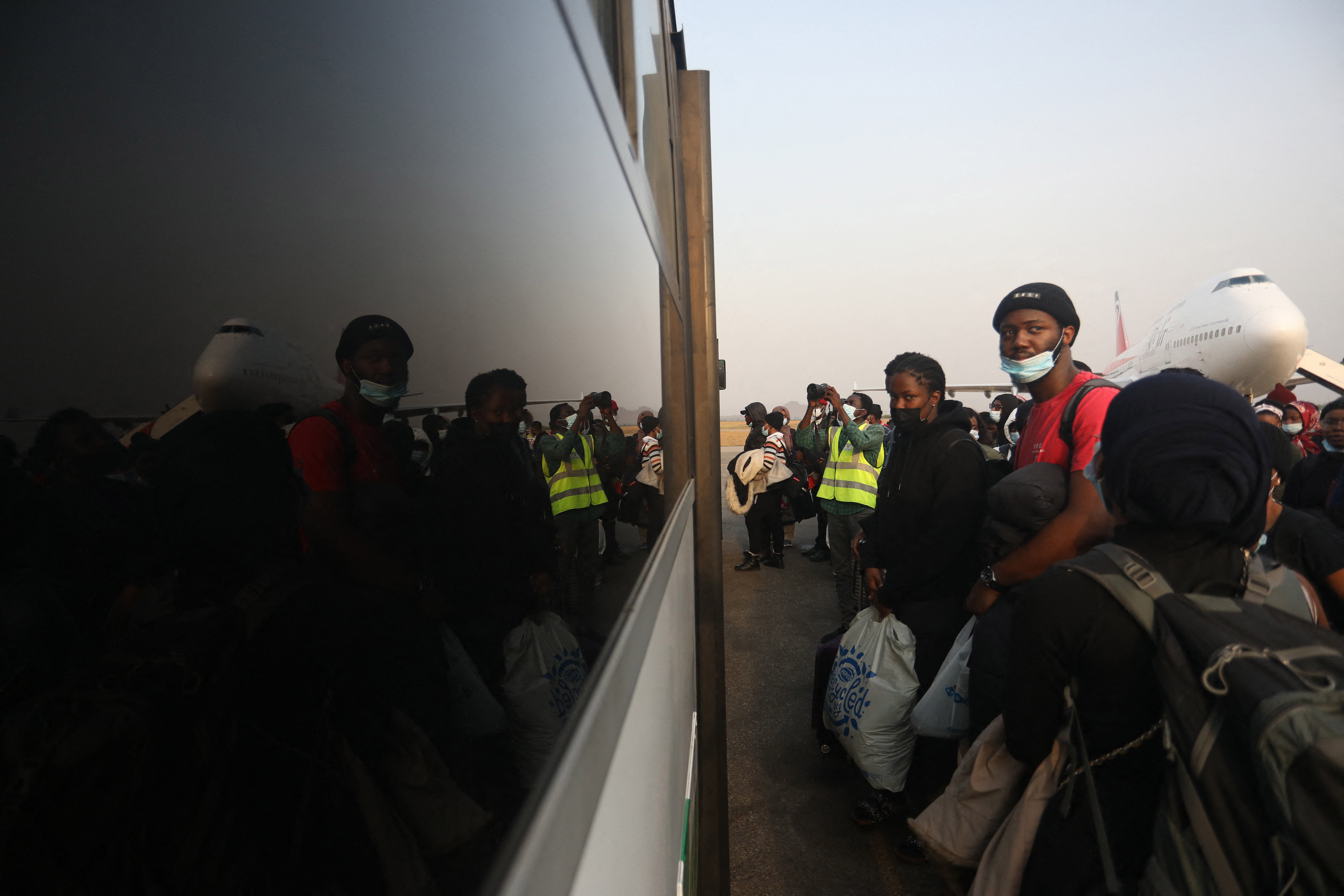
But for Moscow, African countries’ responses nonetheless hold significance.
“Russia, because it’s isolated, wants to have as much international support and cooperation as it can,” said Mr Siegle. “It’s part of Russia’s effort to present itself as a global geostrategic power.”
Moscow made a renewed push for influence in Africa and Latin America after the annexation of Crimea in 2014 when it quickly found itself shunned and with few friends on the world stage.
Mr Siegle suggested another reason why Russia may want to maintain relations with – and military bases in – African nations.
“It’s not coincidental that North Africa is on the southern flanks of Nato, so by establishing a foothold there … and now moving into the Sahel, Russia does have a base of operations south of Nato,” he said.
Ms Hassan noted that Russia has “aggressively” cultivated African relationships over the past five years through business and media engagements and conferences like the 2019 Russia-Africa Summit in Sochi.
“Russia is able to maintain its position as an alternative power to the US only if it has supporters,” she said. “So it needs African countries just as much as – or maybe even more than – African countries need it currently.”






Join our commenting forum
Join thought-provoking conversations, follow other Independent readers and see their replies
Comments